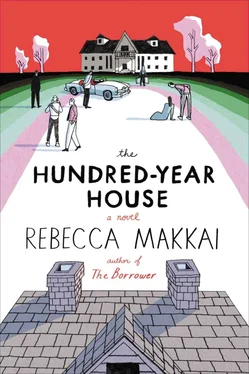Armand: “We’ll charm him.”
Samantha: “It won’t work. And what then?”
“Then, anything and everything. Desperation.”
VIKTOR IN HIS STUDIO: THE WINTER’S TALE
It is a dance to be done to a wall.
On the stage, it will be a dance to a statue, to the frozen Hermione. Leontes will dance his grief, his longing, for the wife he betrayed and killed, and then — then! — the statue steps down, Hermione lives, and there is to be the most exquisite pas de deux , all the more wrenching for their sixteen-year separation, for the age of the dancers. If only he can create the thing. But for now, in the Longhouse, he lives inside Leontes’ dance of despair, the score spread around him on the floor like icebergs. His feet bare. The music is in his head, and he dances to the western wall. Zilla is through that wall (Armand Cox is through the other) and there are times when he knows she’s standing not two feet away, facing him, brush in her left hand, a brush in her teeth, painting on her thin cloth. If there were no wall, if there were no cloth, she’d be painting the same air he is dancing in.
In sixteen years, he will not need a statue to remember her body, her face.
He dances as far as the dance is written.
He presses his hips to the wall.
Armand and Ludo, hunting down the other artists, giving them their roles.
—
Josephine at the window, to Fannie: “It’s one of the last good places in the world, isn’t it? One of the last.”
—
Viktor, walking Marlon around to sober him up. Marlon: “Have you seen those photos of Zilla? The ones her husband took? And exhibited in public! They’re — let me tell you. Let me tell you.” Viktor: “Yes. I’ve seen them.”
—
Zilla and Samantha in the kitchen of the director’s house, giggling like children, tearing at the thin plaster of the wall around the small black hole, until chunks come away in their hands and the opening is two feet square between the counter and the icebox.
“There, see? That cross beam back there,” Samantha says.
They reach carefully into the hole with the bottles they’ve brought from the library, and line them up along the exposed beam: gin, bourbon, rye, scotch, vermouth, all new and full from the bootlegger’s drop.
Zilla: “That’s the ugliest speakeasy I’ve ever seen.”
“It’ll do.”
They nail the square board over the hole, as gently as they can, so the bottles won’t fall.
—
Outside, sunshine and wind.
ARMAND AND EDDIE IN THE FLOWERED BEDROOM
He found Eddie under the desk, tucked in a ball, writing in a small black notebook. Armand understood instantly, and wanted to tell him so: that it sometimes felt better like this, tucked into something solid, hidden from the world. Instead, when Eddie scooted halfway out, what he said was, “You look like a turtle.”
Eddie laughed and nodded, but he didn’t come any farther, so Armand sat Indian style on the floor.
“I’m sorry to interrupt,” Armand said.
“I’m glad you did. I didn’t like what I was writing.”
Eddie was so controlled, so careful. His eyes, though — the way they pulsed around the room and then back to your face — it was as if they were taking in everything with such tremendous force, such thirst. A good chance this was the reason for his quiet. There was so much pouring in that nothing could come out.
Armand told him his role for the evening, and said nothing would go into effect till Samantha gave the word. “We might yet be wrong,” he said. “He might be paying a purely social visit. To absorb some culture, you know. Perhaps he wants to learn to paint. Ha.” Eddie didn’t say anything. “It’s not a full plan, I know, but it’s something. God, I’d love to draw you under there. The lines are fantastic. It’s just the desk and your head and your knees.”
Eddie blushed. Everyone blushed when you said you wanted to draw them. It was perhaps the most flattering thing in the world. Not the suggestion that you were beautiful so much as the implicit revelation: I see you. I really see you.
Armand said, “You’re so quiet.” And without knowing he would, he reached forward and grabbed Eddie’s jaw and popped it open like he was giving a dog a pill. He pulled a nickel from his pocket and stuck it on Eddie’s tongue. Eddie closed his mouth. Armand let go of him.
Eddie managed to say, “Why did you do that?” The coin still in his mouth. Armand heard it click against his teeth.
“I thought if I paid the nickelodeon it would make some noise. And see? It worked.”
THE WHITE RABBITS APPRAISE GAMBY
Mr. Devohr has requested dinner at five — a bad sign, surely. There will be no drinks before, no gathering in the library. When they enter the dining room at four-fifty, Gamby Devohr is already there, Samantha at his side. She’s managed to put on a dress.
Fannie whispers to Josephine: “He looks like a starfish. Stuffed in a suit and fitted out with a black wig.”
Josephine to Fannie: “He doesn’t resemble his mother one bit.”
Fannie: “Not a bit.”
They glance to where Violet hangs on the wall, darkly regarding her endless stream of uninvited houseguests.
“He’s terribly young.”
“He’s twenty-five.”
“Keep your voice down.”
“He can’t hear.”
“He flunked out of Yale, Samantha said.”
“But I thought he left to marry the girl. And seven months later, wouldn’t you know, a baby!”
“It’s amazing how quickly they grow them, these days.”
“Look, someone’s folded all the napkins like little sailboats. How swank!”
The artists file past to shake Gamby’s hand, to thank him for his generosity. Armand has traded in his knickers for ludicrous Oxford bags, a facetious nod to formality, and as he introduces himself Gamby stares, confused, at what appears to be a floor-length skirt. When Samantha introduces Marceline, Gamby turns red. “Miss Horn,” he says. “It’s a great honor. I watched you in Old Kentucky , and you were just swell. Wasn’t that you in The Statesman ? In the dress, you know, that dress? I’d love to — wow, I’d love to hear some of your stories!”
Fannie can’t look at Josephine, or they’ll both laugh. Gamby is nothing more than a little boy in a suit. The silly nickname fits.
Marceline accepts the kiss on her hand. “The honor is entirely mine.”
Fannie, whispering: “His father’s been trying to boot Samantha for years, Zilla said. Only the board wouldn’t.”
“Augustus? That’s the father?”
“And he had a stroke last year.”
“He’s got something to prove, then, hasn’t he? Gamby.”
“Show up at the old man’s bedside and give him back the house.”
“Look how smooth his hands are!”
“And plump!”
They sit to eat.
Josephine to Fannie: “Wouldn’t we love to sculpt him?”
Fannie to Josephine: “I’d do it in mashed potatoes. With a little butter hat.”
The food was elegant, a stretch for the cook: consommé julienne, roast Surrey fowl with bread sauce, hearts of celery, new potatoes in cream. Eddie struggled to eat.
Gamby asked them each, cordially, about their work. Armand said, “You’ve probably seen my magazine covers and forgotten them at once. I did a lot of fadeaway girls, when that was the style.”
“I suppose they model for you!” Gamby said. “The girls.”
“Certainly.”
“And why does it help to be here in the woods? Don’t artists thrive in the city?”
Читать дальше












